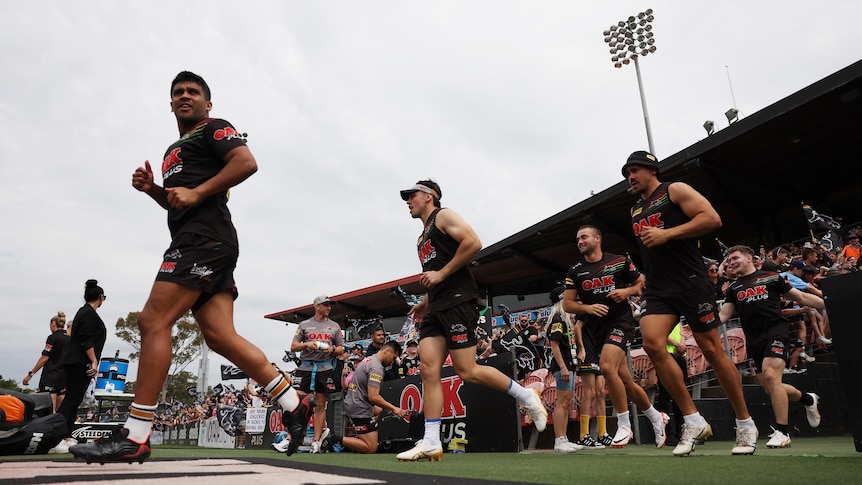They are the batch of value-for-money Penrith players who keep the dynasty alive when the NRL’s salary cap inevitably takes hold.
The men who aren’t part of Penrith’s ‘big nine’ who will line up for a fourth grand final on Sunday, and those who didn’t come direct from the NRL’s best junior system.
Instead, these are the players bought cheap and with little cap room to work with, brought to the foot of the mountains by the lure of a premiership and the chance to revitalise their careers.
We’re talking Jack Cogger, Luke Garner, Tyrone Peachey and Zac Hosking.
Or Scott Sorensen, Jaeman Salmon, Sean O’Sullivan, Paul Momirovski and Matt Eisenhuth in years past.
“On average we’ve had probably four blokes come from outside each year,” Penrith’s football boss Matt Cameron said.
“One of the things we always talk about is trying to target the right ones.
“(Recruitment manager) Jimmy Jones hasn’t been to New Zealand in five years. We don’t actively go and recruit into our junior system from outside anymore.
“We love our own backyard, and our recruitment is in that western corridor.
“Then we supplement it in the NRL squad.”
Penrith’s roster management — from teenage pathways to the NRL squad — is at the same time simple and complex.
Decisions on who the club must fight to keep and who they can afford to lose are based on players’ projected progress years in advance.
If Penrith know they have a junior rising through the system who will soon be a star, careful planning determines how they can be blooded and retained.
In the past three years, Penrith have lost enough junior talent to big-money offers from other clubs to arguably form another top-eight side.
What’s left is the bones of a system that remains the best in the NRL.
There is Isaah Yeo’s group, of which he is close to the last-man standing but once included Reagan Campbell-Gillard, Waqa Blake and Dallin Watene-Zelezniak.
Nathan Cleary’s junior age group now form the core of the team, while Stephen Crichton’s cohort includes Izack Tago, Spencer Leniu and Taylan May.
A new group is also emerging, with 18-year-old Jesse McLean likely to be the first to burst onto the scene.
Some of the club’s most underrated decisions are taken around value-for-money recruits to supplement the squad.
“When we look at those blokes who are coming in, we are looking for one of two things,” Cameron said.
“We are looking for connection … And we want them to know what winning looks like.”
Cogger was brought to the club this year having played Australian schoolboys in the same period as Cleary, and has done a mighty job deputising for missing halves.
Garner debuted under Ivan Cleary at Wests Tigers, Peachey was returning home to Penrith after five years away and Hosking was a back-to-back NSW Cup player of the year at Newcastle.
Next year’s recruits follow a similar trend.
Daine Laurie has taken a pay cut to return home from the Tigers, while Paul Alamoti has served a year under former Penrith assistant Cameron Ciraldo at Canterbury.
“The connection is massive for us,” Cameron said.
“If I draw a line between Jarome (Luai), Critta (Crichton), Tiny (Taylan May) and Brian (To’o), they’ve all played junior reps together.
“High proportions of them are at the same junior leagues clubs as kids. They either go to school at St Dominic’s or Blacktown Pats.
“We don’t want players coming in thinking they don’t know anyone.”
That connection forms part of the reason Penrith can rarely be accused of looking clunky on the field.
“One of the things we talk about when we play is we look connected,” Cameron said.
Players also find it hard to say no when the Panthers come calling.
Unsigned by Cronulla, Sorensen was considering heading to the English Super League — or giving up football — when Penrith offered him a chance in February 2021.
The second-rower has since won two premierships and represented New Zealand.
“It nearly blew me off my chair (when they called),” Sorensen said.
“One thing they do well is keep each other accountable, and knowing if you put the work and time in, good things come.”
Cogger was already in England and now has a Newcastle deal for next year, while Hosking could see the writing on the wall at Brisbane.
Garner is one of the rare players Penrith lured away from another club, but even he rejected interest from elsewhere to sign.
“It’s hard to say no,” Garner said.
“Seeing their success in the past couple years, it’s something that everyone wants to be part of.
“They’ve been through a lot together and have got a tight bond.
“But coming into this team I’ve really got that tight bond with them. It was pretty easy to adjust.”
GET MORE NEWS HERE
